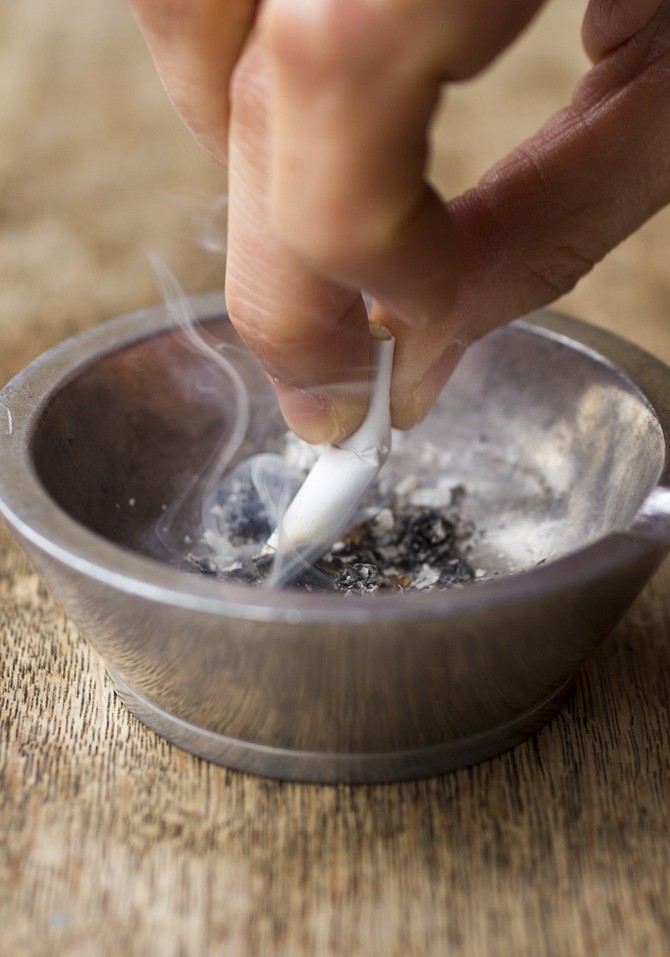Dr. Oz's Best Advice for Beating Heartburn
Heartburn can strike at any time and can decrease your overall quality of life. The good news: You can tame the burn by taking these simple steps.
By Dr. Mehmet Oz

Photo: PhotoAlto/Laurence Mouton/Getty Images
Most people experience it at one time or another—an uncomfortable warm, burning sensation in the chest known as heartburn or acid indigestion. Heartburn has nothing to do with the heart but is caused by stomach acid. It occurs when gastric acids back up into the lower esophagus. Common symptoms include burning in the chest area (usually below or behind the sternum), pain that intensifies when lying down and sometimes coughing or wheezing. Left untreated, persistent heartburn may lead to ulcers, chronic coughing and more. Or you could have GERD (gastroesophageal reflux disease.) Along with persistent heartburn, symptoms of GERD include throat burning, sour taste in the mouth, burping, trouble swallowing and sore throat. (If you are suffering from more severe heartburn and/or suspect you have GERD, please consult your doctor.) Don't let heartburn take over your life—fight back with these lifestyle changes.

Photo: ASIFE/iStock/Thinkstock
Keep Your Digestive Tract on Track
You've heard that regular exercise is one of the best things you can do to increase overall health and longevity. Now you can add another reason to get your body moving. Physical activity helps keep your digestive tract running smoothly and also relieves stress, a major cause of heartburn.
To help ease heartburn, fit some movement into your day, every day, whether that means hitting the gym, taking a 20-minute bike ride or simply strolling around the block. It's a good idea to wait at least 30 minutes after eating before exercising. Some exercises such as crunches or a core workout on a full stomach can lead to heartburn. Also, avoid engaging in activities that require a lot of bending (such as gardening) immediately after eating.
To help ease heartburn, fit some movement into your day, every day, whether that means hitting the gym, taking a 20-minute bike ride or simply strolling around the block. It's a good idea to wait at least 30 minutes after eating before exercising. Some exercises such as crunches or a core workout on a full stomach can lead to heartburn. Also, avoid engaging in activities that require a lot of bending (such as gardening) immediately after eating.

Photo: Olha_Afanasieva/iStock/Thinkstock
Eat in Moderation
Overeating is one of the primary causes of heartburn. To eat smaller meals, trick your appetite by using smaller 9-inch plates rather than traditional 13-inch dinner plates. A portion of meat or protein should be roughly 3 ounces—think the size of a deck of cards. When it comes to starches, think of a tennis ball, or a fist, which is roughly a cup of pasta or rice. Don't skip meals or starve yourself since this can also lead to overeating. Eat every 3 hours to control appetite and prevent binging. (That includes a healthy breakfast, lunch and dinner, as well as midmorning and afternoon snack such as an apple or handful of almonds.)

Photo: Nanisimova/iStock/Thinkstock
Put These Foods on Your Verboten List
If you're a frequent heartburn sufferer, you want to stay away from high-acid foods like tomatoes and citrus. Other foods to avoid include onions, garlic, chocolate and peppermint. Spicy, fried and fatty foods are also common heartburn triggers. Watch what you drink as well—too much coffee, tea or alcohol can also bring about heartburn. Drink these beverages in moderation: one to two cups of caffeinated beverages per day; and two alcoholic beverages per day for men, one for women.
In general, eat a low-acid diet. Modify your favorite foods to prevent heartburn with these tips: Trim fat from meats; make your chili recipe mild rather than spicy; use ginger, cinnamon or thyme to add flavor to foods (these herbs may reduce heartburn); and broil or grill meats and fish rather than frying them. Lastly, heartburn-soothing foods include banana, melon, Manuka honey and chamomile tea.
In general, eat a low-acid diet. Modify your favorite foods to prevent heartburn with these tips: Trim fat from meats; make your chili recipe mild rather than spicy; use ginger, cinnamon or thyme to add flavor to foods (these herbs may reduce heartburn); and broil or grill meats and fish rather than frying them. Lastly, heartburn-soothing foods include banana, melon, Manuka honey and chamomile tea.

Photo: Picturenet/Blend Images/Thinkstock
Become a Detective
If you suffer from frequent heartburn and can't get a handle on why, keep a journal and track your triggers. Write down every time you get heartburn so you can determine what caused it. Was it that extra cup of coffee in the morning or the slice of pepperoni pizza you devoured late last night? Did a meeting with your boss stress you out? Stress can cause heartburn so know your stressors and work to avoid them. A walk at lunchtime can relieve stress and aid the digestive tract—double defense against heartburn!

Photo: Wavebreakmedia Ltd/Thinkstock
Dine Like the Europeans Do
Build in time after eating meals—a habit that can help you digest your food properly. By eating too fast—wolfing down a cheeseburger at a drive thru, for instance—can increase your chance of heartburn. Eat healthy meals and avoid rushing through them. Enjoy leisurely dinner conversation with family and friends. If you're dining alone, read the paper, call a friend or go for a casual stroll afterward to aid digestion.

Photo: Joerg Steffens/OJO Images/Getty Images
Chew On This
Chew a piece of sugar-free, non-peppermint gum after a meal for about 30 minutes to help reduce the chance of developing heartburn. Gum increases saliva and can help neutralize stomach acid. If you don't like gum, try sugar-free lozenges.

Photo: George Doyle/Stockbyte/Thinkstock
Watch Your Weight
If you're overweight or obese, you're at an increased risk for heartburn. Although heartburn does occur in skinny people, excess abdominal fat (called omentum fat) can put extra pressure on the stomach, forcing its contents upward into the esophagus, causing reflux that contributes to heartburn. If you are overweight, losing just 10 pounds can offer some heartburn relief. To help drop weight, invest in a pedometer and try to get 10,000 steps a day.

Photo: momentimages/Getty Images
Loosen Up
Tight clothes can put pressure on the abdomen and increase heartburn. Avoid control-top underwear and shapewear. Make a habit of wearing comfortable, less restrictive clothing such as loose-fitting pants, pajamas and belts to ease pressure on your stomach area.

Photo: skhoward/E+/Getty Images
Try These OTC Remedies
For occasional heartburn, OTC antacids can help neutralize stomach acid and provide temporary relief. H2 blockers reduce the amount of acid your stomach makes and can help ward off heartburn by taking them before a meal. PPIs (proton pump inhibitors) treat persistent heartburn by reducing a greater amount of stomach acid than antacids or H2 blockers, and may provide longer-lasting relief.

Photo: AnjelaGr/iStock/Thinkstock
Bulk Up On Fiber
Consuming more fiber can help reduce heartburn symptoms by aiding the overall gastrointestinal tract, from the esophagus to the colon. Fiber may help absorb and dilute substances such as excess acid in the gut. In one recent study, those who consumed a high-fiber diet were 20 percent less likely to experience heartburn. Aim to eat 25 grams of dietary fiber per day. (Most Americans are only getting 10-15 grams per day.) Good sources of fiber-rich grains include oatmeal, barley and brown rice. Fiber-packed fruits and veggies include pears, raspberries, asparagus, broccoli and sweet potatoes, to name a few.

Photo: Wavebreakmedia Ltd/Thinkstock
Create a No-Snacking Zone Around Bedtime
If you eat too close to bedtime, you run the risk of developing heartburn during the night. So try to eat 2-3 hours before bedtime. This allows the contents of your stomach more time to empty and less time to reflux once you lie down.

Photo: Jonathan Austin Daniels/iStock/360/Getty Images
Commit to Quitting Smoking
If you're a smoker, here's another good reason to quit. Smoking inhibits the production of saliva, which is alkaline and helps neutralize stomach acid. Smoking also causes the muscle between the esophagus and the stomach (lower esophagus sphincter or LES) to relax, which allows stomach acid to rise back into the esophagus—causing heartburn. (Check out this advice on breaking bad habits.)

Photo: Wavebreakmedia Ltd/Thinkstock
Elevate Your Bed
If you experience heartburn at night, try elevating the head of your bed by approximately 6 inches. This practice helps with the aid of gravity, so stomach acid does not rise back up. Use blocks under the head of the bed, or insert a wedge between your mattress and box spring to prop your body from the waist up. Mattress wedges are available at drug stores and medical supply stores.

Photo: Wavebreakmedia Ltd/Thinkstock
Time Your Medication Right
During sleep, the production of saliva and habit of swallowing occur far less often than during waking hours. This can cause pills taken at night to stick in the throat or esophagus, causing irritation of the esophageal lining and increasing stomach acid production. If you take pills at night, sit up for at least 30 minutes before lying down in bed.
Published 08/19/2014

